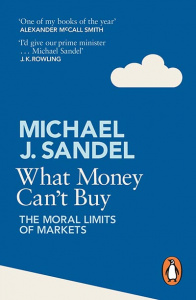What Money Can’t Buy
 By Michael Sandel
By Michael Sandel
Review by Aparajita (PPE)
When I was looking to apply for PPE I found myself bombarded with long lists of books that I “should” have read before applying. However, reading long textbooks was far beyond my ability and interest level. Luckily I found What Money Can’t Buy. Written by Michael Sandel about the moral limits of the free market, it combines the disciplines involved in PPE, making it a perfect book to get started with. I had never studied economics or politics prior to reading it but that really didn’t matter. Sandel combines bits of each subject and makes them extremely relatable, perfectly introducing problems with the free market in terms that are not too academic.
Contrary to many books that I had tried, its chapters could also be read in isolation; they all had real life application and a story that made them easier to relate to. This makes the book perfect for picking it up in short spurts. It focuses on the things that we chose to sell in the modern day, which some people, Sandel included, see as morally questionable. For instance, should we use money to prevent drug addicts from having children? At first it may seem like a flawless way to stop suffering, drug addicted babies from being born. However, the problems with the policy become apparent when Sandel starts to look at the lack of “free-will” possessed by the drug addict as a product of their addiction.
When I first read the central idea of the aforementioned problem, I was immediately in favour of such a scheme. Presented from Harris’ (the founder of the scheme) perspective, I could see no reason why avoiding drug addicted, suffering children from being born could ever be morally reprehensible. Sandel helpfully splits it into two problems: the lack of free will and the potential bribery involved.
The book makes you think. Sandel’s writing and his ability to look at and detail different sides of the given argument immediately drive you to think about the issue at hand. It no longer feels like you are reading the book with a view to applying to university, but more that you are learning about difficult, real world scenarios. There will be something that you connect with. If not the babies, maybe the hiring of agents to stand in the queue for tickets to an oversubscribed, “free” show, or perhaps the idea of life insurance. The questions posed, with no prescriptive answer, made me all the more interested in applying for PPE and looking for a way to answer them.
I would really advise giving this book a go if you are looking into applying for any course with a focus on philosophy or if you would like to read something that critiques the way that our economies currently work. I found the book extremely easy to get into, with a lot of detail on specific cases that helped me to relate potentially abstract problems to the real world.
Review by Lucy (PPE)
This book is a great introduction into the pervasive nature of markets: accepting the inevitability of becoming a market society, then asking if this is the world we want to live in. My favourite thing about the book is Sandel’s tone: accessible, yet highly thorough.
He questions the morality of all the odd things that can be bought and sold today, and it ends up reading more as individual stories — stories of concert tickets and of bribes, of nuclear waste sites and of paying for friendship. Through these examples he shows how, in the last decades, our morality around these things have changed, and now we can put a price on civic values. Without being too pessimistic, he expresses how commodification was inevitable at first and, without being too condescending, he encourages a more participatory role everyone should take in discussing whether we have lost our morality and whether we need to bring it back. Is it wrong to offer money to drug-addicted women if they undergo sterilization? Does paying kids for getting good grades remove something humane and natural from education? Sandel suggests so, and though it is hard to put this intangible human value that’s missing in these transactions into words, he does so with a philosophical flair.
I read the book before considering an economics degree and it made me realise that the morality of the economy should be a much more prominent question, which is a huge reason I chose to study PPE. The book comments on inequality, altruism, and real-world examples that are both shocking and fascinating. I would highly recommend this book to anyone, as Sandel’s insights are applicable to anyone who buys things, will buy things, or has ever bought things, but specifically to anyone considering studying economics and philosophy. This book will easily illuminate any passion you have for the relationship between morals and money.
What Money Can’t Buy by Michael Sandel
ISBN-10: 0241954487
ISBN-13: 9780241954485
Try checking the availability of this book at your school or local library or explore second hand bookshops and websites. You may also wish to purchase from either Amazon or Blackwell’s.
